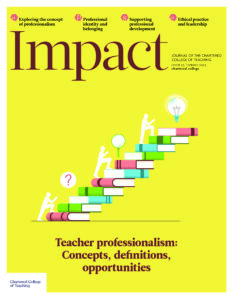KAREN STEPHENS, SENIOR TEACHING FELLOW – PRIMARY EDUCATION, UNIVERSITY OF GREENWICH, UK
Professionalism can be seen as the cornerstone of effective teaching, but as a concept it is questioned and convoluted by a discourse that has moulded and fashioned it over time (Evetts, 2009). It is not easily defined (Sachs, 2016; Goodwin, 2020), with a diverse debate on its definition and how it is acquired (Creasy, 2015). For student teachers training in England, the first introduction that they have to professionalism as they begin their journey to becoming a teacher is the introduction of the teachers’ standards (DfE, 2011), which they must meet by the end of the programme to be awarded qualified teacher status (QTS). Initial teacher training (ITT) is the process that prepares new teachers with the skills, knowledge and experience needed to meet the teachers’ standards and enter the teaching profession. Prospective teachers in England can choose from several ITT routes, each tailored t
Join us or sign in now to view the rest of this page
You're viewing this site as a guest, which only allows you to view a limited amount of content.
To view this page and get access to all our resources, join the Chartered College of Teaching (it's free for trainee teachers and half price for ECTs) or log in if you're already a member.












I found this piece really thought-provoking. As someone still training, it made me reflect on how I’ve been thinking about professionalism — not just as a list of expectations to meet, but more as something that develops gradually through what we do, how we respond, and how we grow. The part about using our own experiences really stayed with me. It’s easy to forget that what we bring personally can actually help shape how we teach. That idea gave me a bit of reassurance — that I don’t need to have it all figured out straight away, just be open to learning.